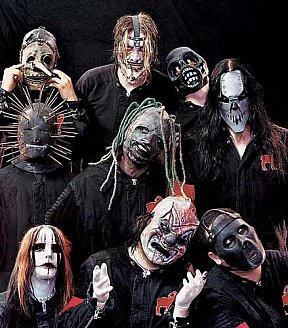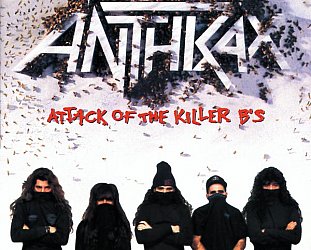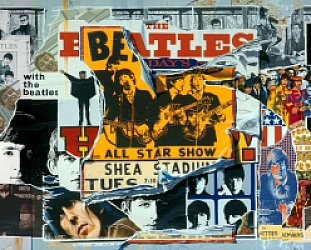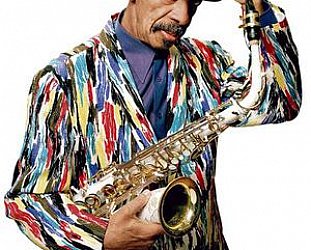Graham Reid | | 6 min read

Heavy metal is for young men without a war of their own, wrote a wag in Creem magazine some time in the early Seventies. At the time Led Zeppelin were stomping across the planet delivering their stolen blues and post-pop at ear-shattering volume. You can catch it in their concert film The Song Remains the Same -- and they look like a bunch of pussies.
Metal these days is a much more aggressive beast, and fills that crucial gap between homework and flat-hunting for young men.
Like most musical movements it has its own name, to ensure adults don't confuse Limp Bizkit with Led Zepp. And one that's doubtless handy in the record-company boardroom.
The new label is a useful marketing device -- remember when grunge took to the catwalks of Milan? -- when selling stuff like Limp Bizkit to an audience that just won't buy your corporate crap, man.
Heavy metal is now "nu-metal," but spotty boys in black T-shirts won't be impressed if you mention you've always liked a bit of metal and haul out your battered copy of Budgie's '74 rifforama In For the Kill, which is more a reference point than they might want to admit.
Every generation gets the metal it deserves, so it's out with the old and in with the nu. Even those angry bands of what seemed like just a few years back -- salacious Slayer, the disciplined Metallica and Guns'N'Roses even -- pale in comparison to nu-metal.
Nu-metal is louder, harder, more angry, more incoherent, more ... it's just more. It is where gangsta rap meets old metal, a fusion for a generation that grew up with NWA and Public Enemy as much as grunge and classic rock.
Nu-metal is the latest loud revolution. It is almost exclusively American and in its live incarnation is, as London rock columnist Neil McCormick noted, like stumbling into a satanic version of a school disco.
This may be angst-filed adolescent rock full of non-specific anger, but there's nothing wrong with that.
Paul Rees, editor of the bible of metal Kerrang! said most of the nu-metal bands -- Slipknot, Amen, Papa Roach and others -- were on to only their first or second album and it remained to be seen if they had anything to say other than woe is me.
"Most punk bands and grunge bands died out because they didn't adapt and evolve," said Rees. "Whereas Pearl Jam survived because they did. It'll be interesting to see if Slipknot can do the same thing."
Well, actually, no it won't. Who cares? Rock'n'roll when you are 18 isn't about wondering whether your band of the moment will be there with you in 20 years. That's a music-industry perspective.
Nu-metal, like the best rock'n'roll, is about that noisy moment in which you can find or lose yourself.
It's the concert, which is the gathering of the tribe, the thrash and catharsis of a band you've loved and listened to in your bedroom now made flesh under the lights.
In that, nu-metal - although easy to be cynical about - is the essence of the rock'n'roll ethic. And it isn't unfamiliar - we've been here before.
Nu-metal's emergence is easy to explain: ghetto rap and crossover white boy Eminem pasted "parental guidance" stickers across contemporary rock culture and elevated bad-boy behaviour. And one of the most important aspects of rock is its parent-baiting possibilities.
If someone else can do your swearing for you, then you haven't really offended Mum and Dad and will still be allowed out on the weekend.
The album by nu-metallers Amen boasts the threatening title We Have Come For Your Parents. However, as McCormick observed of an Amen show: "Judging by the number of concerned-looking adults parked outside the venue waiting for the show to finish, it was evident that their parents had, in fact, come for them."
Perhaps we can safely assume their audience won't take the advice lead singer Casey Chaos yells on Justify: "Get up and set fire to your church."
Add to the dirty-word factor the post-grunge possibilities of lyrical angst (see Nirvana and early Pearl Jam) and you have identified a target audience.
Selling anger, misery and self-doubt to teenage boys? Gee, that's original.
Yep, nu-metal is chock-full of goth-rock self-hatred and nihilistic, grinding death metal. Cool!
And that's the great advantage of nu-metal, it isn't difficult to interpret.
Amen's music for example is flat tack and its antecedents are great bands such as Anthrax, but without their sense of The Song. Amen rage against the machine (parents, "the pigs" rather quaintly, something about fire regulations), but it's all undifferentiated. Getting pissed off at your PE teacher registers on much the same level as the pointlessness of life or suicide of a friend.
Nu-metal bands whine and are more self-pitying than even adult rock acts such as those notorious bed-wetters Coldplay. Here's Limp Bizkit: "This world is a cage and I don't think it's fair, and I don't even think that anybody cares."
Not Denis Glover nor Janet Frame, but he's right. The world isn't fair.
But for all its standard adolescent knee-jerk and exploitation of the whingeing of young American white kids with too much time on their hands, nu-metal is also a healthy reaction against the faceless, manufactured pop cluttering the charts.
Ask yourself: if you were 18 and hated everything about Britney Spears and her shallow world -- other than you'd want to get her in your bedroom and really show her something -- then why not nu-metal?
It's about rage and burning and suicide and ... oh, just all the real stuff, while the world around is full of, as Holden called them in Catcher in the Rye, phoneys.
J.D. Salinger's seminal teen-angst novel, still read in American high schools today, was published 50 years ago. Nice to know little has changed, other than getting louder.
"A more aggressive kind of music is developing because a lot of young people are looking at mass-produced, pre-processed pop and recognising it for what it is," says Phil Alexander, editor of Kingsize, an English glossy aimed at 18- to 30-year-olds for whom nu-metal is a lifestyle choice.
"They want music that makes them feel something, that inspires them, that sticks two fingers up to the world. In an era when everything is homogenised and neutralised by commercial constraints, metal is the last rebel music."
Well, maybe and maybe not.
It's hard to take Limp Bizkit frontman Fred Durst seriously as a lieutenant in an army of rebels when he lives in a Hollywood mansion, has a bust of Napoleon in the lounge and wants to own a castle. That sounds more like an Elton John career aspiration than angst 'n' anarchy.
As rock writer Nicholas Barber noted, "When Fred Durst is not selling juvenile disaffection, he poses with Playboy models." But when you are an awkward teenage boy tongue-tied around girls, this must be a fantasy come true.
The best thing about nu-metal bands is they put a little care into their appearance.
Your serious nu-metaller, of course, won't have a bar -- let alone a chorus complete with Bible burning -- of Marilyn Manson, who is a showbiz fraud and as manufactured as Westlife.
Bands such as Slipknot -- rock rebels and Grammy nominees -- who wear full-face pull-on burglar masks and do the self-mutilation thing are the nu-metal heroes. Yes, they're a bit obvious, but nu-metal isn't about being subtle.
Nu-metal is what it is: adolescents' anger and confusion channelled through people a decade older than them, marketed by people a decade older than even them, and recorded by companies founded by people a decade older than the marketing department stooges.
Interestingly enough, Amen get international distribution on Virgin, the label founded by Sir Richard Branson, who started it on the back of Mike Oldfield's prog-rock Tubular Bells, bits of which were used in The Exorcist.
And when you think about it, wasn't that the greatest teen alienation flick ever?
Talk about the circle being unbroken.







post a comment